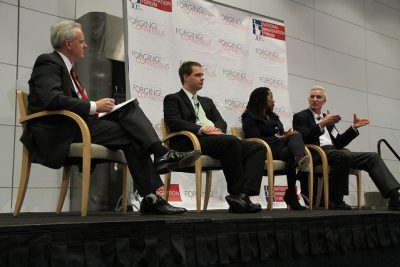Entrepreneurship & Innovation

Why Regional Economies Need Immigration Reform
Comprehensive immigration reform and its array of issues is a hot topic of discussion these days at the national level. Yet while those in Washington continue crafting proposals, states are most impacted by the country’s current outdated immigration system and are making the economic and moral case for reform, as a recent Chicago Council on Global Affairs report highlights. Read More

The Promise and Challenges of Family-Based Immigration
Today the U.S. House Committee on the Judiciary is hosting a hearing on “The Separation of Nuclear Families under U.S. Immigration Law”. The issue to be addressed relates specifically to the obstacles that many legal permanent residents (LPR) currently living in the United States face when they try to bring their immediate relatives to the country. While there are neither country nor yearly caps for immediate relatives (currently defined as opposite-sex spouses and minor children) of U.S. citizens who want to immigrate to the United States, there are only 87,900 immigrant visas available each year for immediate relatives of LPRs. In addition, no country can receive more than 7 percent of the visas available for all immigration categories in a fiscal year. In 2012, for example, the maximum number of visas available per country was 47,250. And because the demand for visas in some countries is much larger than the number of visas available, some LPRs have to wait several years to be able to bring their spouses and unmarried children. Read More

State Level Immigration Legislation and the Essential Economy
We often take for granted the important role “behind the scenes” workers – farm labor, restaurant work, and home health care – play in driving our economy. That’s one of the many conclusions of a new report from the Essential Economy Council, which studied the economic and social value of industries that make up what they have coined the “essential economy.” The report identifies six industrial sectors important to our daily way of life, including: agriculture and poultry; hospitality and restaurants; light construction and landscaping; personal care and assisted living; building maintenance and facilities service; and distribution and logistics. For the state of Georgia, the essential economy is a significant component of the state’s overall economy. In particular, the essential economy contributed 12 percent ($49 billion) to Georgia’s GDP in 2010; contributed over $114 million in sales tax in 2011; employed just under one million out of 3.7 million workers in Georgia in 2011; and is present in every country in the state. Read More

Skilled Immigrants Come Through All Immigration Channels
Note: Today’s blog features the oral testimony of Benjamin Johnson, Executive Director of the American Immigration Council before the House of Representatives, Committee of the Judiciary, Subcommittee on Immigration and Border Security today. Mr. Chairman and members of the committee, thank you for the opportunity to appear before you today and provide testimony on behalf of the American Immigration Council, a non-profit educational organization that for 25 years has been dedicated to increasing public understanding of immigration law and policy and the role of immigration in American society. Read More

Building Bipartisan Bridges in Congress for High-Skilled Immigration and Entrepreneurship
Tomorrow, the House of Representatives will hold a hearing to discuss, “Enhancing American Competitiveness through Skilled Immigration.” The hearing is likely to highlight both the bipartisan support for high-skilled immigration reform, and a series of new bills that would increase the supply of STEM visas. Read More

Business and Labor Announce Breakthrough on Immigration Reform
One of the most contentious issues that has stymied past immigration reform proposals is the divide between business and labor over how many and under what conditions the U.S. should admit new immigrants into our labor force. Also known as the “future flow” issue, the conflict lies in the tension between business’ desire to recruit foreign workers and labor’s desire to ensure workforce protections for those working in the U.S. Read More

Can A Nation Have Too Many Smart People?
A February 8 op-ed in the New York Times entitled “America’s Genius Glut” argues that America already has too many high-tech workers, and thus does not need more scientists and engineers from abroad. It is a surprising claim that is at odds not only with the empirical evidence, but is out of touch with the dramatic shift in recent years towards a knowledge-based global economy. The United States is not actually suffering from a surplus of intelligent people, nor is it being economically drained by the presence of intelligent people who were born in other countries. In fact, the U.S. high-tech economy would not exist in its present form if not for the contributions of innovators and entrepreneurs from every corner of the globe. Despite arguments to the contrary, scientists and engineers who come to this country on H-1B visas are an integral part of that high-tech economy. Read More

Survey: Asian Americans Concerned with Legalization, Family Backlogs
In the current debate, immigration is often depicted as a Latino issue. This is partially because just over half of America’s foreign-born population is from Latin America and the Caribbean, and the current political climate around immigration is largely seen as being driven by Latino turnout for Democrats in the 2012 election. But this depiction glosses over the millions of immigrants – documented and undocumented – who hail from other parts of the globe. Read More

Business and Religious Leaders Come Together to Champion Immigration Reform
Immigration reform is an undertaking of such importance that it should transcend partisanship. That was the fundamental message of the business and religious leaders who gathered together yesterday at a press conference organized by the National Immigration Forum. The press conference was part of a campaign called Forging a New Consensus on Immigrants and America, which describes itself as “a growing and diverse constituency of conservative, moderate and progressive leaders that is determined to go beyond the rhetoric and find common ground for practical solutions.” The event comes on the heels of an announcement late last week by Thomas Donohue, President of the U.S. Chamber of Commerce, that a broad coalition of business, labor, religious, law enforcement, and ethnic organizations has coalesced around the cause of immigration reform. Read More

Lawsuit Uncovers USCIS’ Double Standards in H-1B Program
For the past several years, U.S. Citizenship and Immigration Services’ (USCIS) H-1B visa review and processing procedures have caused confusion and concern among U.S. businesses that turn to highly-skilled temporary foreign workers in specialty occupations to operate successfully. In newly-uncovered documents, it appears that instead of supporting small businesses that attempt to hire highly-skilled foreign workers, in many cases, USCIS discourages their success by subjecting them to a near presumption of fraud. Read More
Make a contribution
Make a direct impact on the lives of immigrants.
